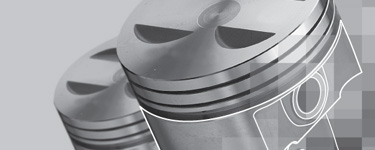This isn’t an end all on which piston is the best or a detailed discussion into piston design. This is just something to be aware of when selecting pistons. A big misconception on “built” engines or more precisely speaking piston selection can be misinterpreted. A forged piston is by far stronger than a factory cast pistons but there’s more to it than just that. What do you realistically plan to do with your engine? Will you be daily driving the car? Can you put up with a noisier engine? Carefully think about what you plan to do. If your planning on competitively racing, run very high boost pressures and\or nitrous and can deal with servicing your engine more frequently; than a 2618 forging would be up your alley. Most factory aluminum pistons are eutectic and hypereutectic. What’s important to know about this is that these pistons have a higher silicon content which allows the piston to have tighter clearances for a quiet, long lasting engine. The amount of silicon is directly proportional to how ductile the piston is. Meaning just how “hard” or “soft” the alloy is. Pistons that have high silicon are technically strong since their alloy has a tighter bond at the molecular level, BUT they’re also much more brittle and don’t stand up to detonation as well as a forged piston with less silicon content. Your piston also isn’t the only part of your engine that’s taking abuse from detonation. More on that some other time.
Something in between a 2618 and a factory piston alloy would be the 4032 alloy. These have more silicon content than a 2618 alloy but no where near as high as a factory piston. The clearances on these engines can be tighter than a 2618 for less noise and wear than a 2618 alloy. A majority of the wear seen on a forged engine is when the engine is warming up. You may have heard of the term “piston slap”. This is the term used for a piston rocking around in the bore until it gets up to operating temperature and expands. This rocking causes wear on the rings and of course on the pistons themselves. Clearances on a 2618 and 4032 alloys need to be “looser” to accommodate the piston when it expands as it gets hot. This would be when it finally warms up, sees boost, etc…. Its best to allow a forged slugged engine to warm up until piston slap can no longer be heard before driving. The popular Wiseco pistons use a 4032 alloy for best of both worlds. It still won’t last as long as a factory piston but it is stronger and won’t wear out as fast as a 2618 alloy.
Typically, Japanese engines have very tight tolerances from the factory to have a “sewing machine” like operation. Nice, quiet, and reliable (long lasting). Hopefully this has helped some of you make an educated decision when selecting your next piston forging, instead of simply choosing the strongest “best” piston. The term best has a relative meaning. What’s “best” for your application?

